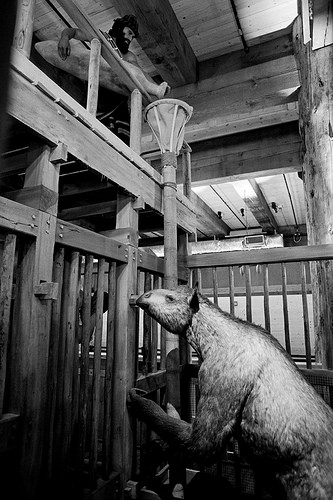
Reminder: we’re having another video chat tomorrow night (7/13 9pm EDT). Feel free to join even if you couldn’t come last time.
We’re in week 5 of discussing The War on Science and I have a confession/apology. I’m reading the book electronically and the table of contents has no page numbers, so I didn’t realize this week’s chapters were significantly longer than the others (Ch 1-2, Ch 3-4, Ch 5-6, Ch 7-8); Chapter 10 alone is nearly a quarter of the main content. In hindsight, it feels as though Otto primarily wanted to write a book on climate change denial and included the rest of the material to put it in a broader context. In general, I think the context is helpful, although having been teased for 8 chapters about the significance of the religious front to the overall war, I was pretty underwhelmed by Chapter 9. Maybe Otto had already scattered his best points about religion in the previous chapters, or maybe I’ve just spent more time thinking about the interaction of science and religion, but for its considerable length Chapter 9 felt light on substance.
The Energy Industry and Climate
Chapter 10 seems to find Otto in his element: crafting journalistic investigation into a compelling narrative. He’s quoting e-mails, exposing conspiracies, and following the money. Otto builds a thorough case implicating fossil fuel extractors and other energy industry players and Republican politicians in a campaign to muddle the public discussion of climate change to avoid regulations on carbon dioxide emissions. The thoroughness can be overwhelming at times, both from the volume of material and the difficulty in accepting that so many people could be so deliberately duplicitous. But the alternative is an even larger number of people lying when they say the Earth is warming.
Given the depth of Otto’s coverage, I was surprised at how little science discussion there was. The rebuttals to common talking points at the very end felt a little tacked on. Otto emphasizes that talking about the scientific process is the way to address misinformation, incorrect assertions, or appeals to uncertainty. I would have appreciated a more detailed exploration of how climate science has been manipulated to be misleading. Maybe it’s because I find it hard to believe folks were and are just flat out lying. So I want to know how specific claims, such as the conflicting claims about polar bear populations, were substantiated. The discussion of the fudged chocolate research was interesting, but ultimately a non sequitur. For all of his talk about legal rhetoric versus scientific reasoning, it felt like Otto was building a legal case at least as much as he was a scientific one.
Given Otto’s broad critique of religion elsewhere, I appreciated the mention of both Katherine Hayhoe’s work among evangelicals and Pope Francis’ encyclical. I did find the discussion of the latter a little curious, though. I think Otto oversold the encyclical as a new development in the Catholic Church’s relationship to science, and perhaps also overestimated the influence the Pope has with American evangelicals. But perhaps I was influenced by my impressions from the previous chapter on the religious front of the war on science. By comparison to his specific and detailed coverage of climate science and climate change denial, Otto’s exploration of religion felt superficial.
Religion, Politics, or Cognitive Bias?

 )
)Right from the start of Chapter 9, Otto is on shaky footing. We get a quote from Kant advocating radical self-determination and anti-authoritarianism as the only way to be mature, but I’m fairly certain Otto would encourage us to seek a physician’s advice on nutrition and diet. And if it is reasonable to yield to a physician’s expertise on health, why not a pastor’s on matters of behavior? For that matter, an insistence that “I’ll do it myself” is the hallmark of the three year old; part of maturing as an adult is learning how to be a member of a community.
Then Otto asserts strongly that Billy Graham was a central figure in turning evangelicals against science when he “railed against science” in his public and televised sermons. I’ve never thought of him as particularly vocal against science, and I don’t see any evidence of that in the lengthy quote from Graham. In fact, I don’t see what the quote has to do with science at all. We’re told Graham was responding to the nuclear arms race; I thought Otto himself made a pretty good case earlier that Americans were justified in questioning the use and expansion of a nuclear arsenal. So is anyone who tries to put any kind of boundaries or limitations on the applications of science now antiscience? Or is Graham antiscience simply by virtue of encouraging religious beliefs? That’s implied by Otto’s call back to Kant, although later in the chapter Otto seems more charitable to religion.
Subsequent discussion of other evangelical leaders similarly paints a stark picture of science rejection, but again none of the direct quotes demonstrate such an attitude. It isn’t until we get to Ben Carson that we get direct evidence of an evangelical leader speaking explicitly and critically about science. And curiously absent are the individuals and organizations specifically dedicated to critiquing evolutionary biology from a Christian perspective; where are Answers in Genesis, The Institute for Creation Research or the Discovery Institute, or Henry Morris or Ken Ham? Michael Behe is mentioned, and the Dover trial gets a couple of paragraphs, but there’s no mention of the Bill Nye/Ken Ham debate or the Creation Museum and Ark Encounter. Given the nearly up-to-the-minute coverage of current events elsewhere, it feels odd for comparably recent and high profile milestones in the evolution conversation to be overlooked. Otto is apparently only interested in explicitly political players.
Nevertheless, Otto does build a credible case that large numbers of evangelicals in particular have strategically and systematically opposed the theory of evolution. But this is hardly a revelation; most everyone involved are quite public and explicit about their intentions and goals. Again the actual science discussion is minimal and in this case I think largely misunderstands the critiques. Antibiotic resistance and fox domestication are the only evolutionary biology topics of substance covered, and virtually no one disputes those observations. I think evolution critics love it when antibiotic resistance is used as evidence because they can observe that at no point do bacteria become anything other than bacteria (likewise for the foxes) and some resistance mutations result in loss of function. My overall impression was that, for all his talk about religion building up to the chapter, Otto really isn’t all that familiar or engaged with origins discussions.
I can never resist an excuse to show this video.
There follows some exploration of sex education and the abstinence-only approach. There’s some evidence of genuine scientific ignorance, but also some anecdotal observations that may represent a poor curriculum even on abstinence or may simply represent the most notable failures. At the same time, some of the disagreement is a matter of pragmatism and morality rather than science. It’s not unscientific to claim abstinence is effective birth control; the real issue is whether teens are effective abstainers. Still, I thought this section was overall a worthwhile contribution, if only for being about something other than evolution for a change.
And that’s really all Otto has to say about religion. We then get another rehash of Popper reminding us science can only be certain about negatives, again undermining Otto’s periodic assertions about positive scientific facts, followed by discussion of partisanship and cognitive bias. The psychology and neuroscience of belief formation and learning seems highly relevant, but I think it should have been a separate chapter. As presented, we get first a conflation of religious belief with partisan politics and then a conflation of religious belief with cognitive bias. But everyone is subject to cognitive bias making it far more broadly relevant. In fact, contrary to Otto’s belief that scientists somehow think differently than everyone else thanks to training in how to think without bias, the actual research shows that intelligent, educated people including scientists are just as subject to bias as the rest of us. And in some cases, intelligence or expertise can make it even harder to recognize one’s bias.
In summary, I think the material on climate science is important and worth framing in a broader context, and obviously Otto is correct that evangelicals question evolutionary biology in large numbers, but I’m not persuaded that Otto is as engaged with the the religious topics to make such strong assertions about religion.
Discussion
- Statistically, abstinence-only sex education seems to be ineffective (although as presented I had some concerns about an ecological fallacy). As Christians, should we embrace the pragmatism of a broader approach to reduce teen pregnancies and abortions, or is there still a place for taking a moral stand?
- I’m not well-versed in Billy Graham’s early career. Was he known for “railing” against science at any point?
- Otto draws a line from rejection of evolution to unmooring from the broader scientific enterprise. Others have suggested that the alternative narratives and skepticism towards academics typical of evolution criticism has trained evangelicals to be more broadly susceptible to misinformation. Do you see any validity to these theories, or is critique of evolution distinct and unrelated to any wider trends?
- Chapter 9 ends with an oddly un-self-aware reflection on how combative to be when engaging with critics of science. Should we be trying to reproduce the success of Rush Limbaugh or Pat Robertson, as P. Z. Myers suggests? Were you persuaded that there is a place for polarization?
Andy has worn many hats in his life. He knows this is a dreadfully clichéd notion, but since it is also literally true he uses it anyway. Among his current metaphorical hats: husband of one wife, father of two teenagers, reader of science fiction and science fact, enthusiast of contemporary symphonic music, and chief science officer. Previous metaphorical hats include: comp bio postdoc, molecular biology grad student, InterVarsity chapter president (that one came with a literal hat), music store clerk, house painter, and mosquito trapper. Among his more unique literal hats: British bobby, captain’s hats (of varying levels of authenticity) of several specific vessels, a deerstalker from 221B Baker St, and a railroad engineer’s cap. His monthly Science in Review is drawn from his weekly Science Corner posts — Wednesdays, 8am (Eastern) on the Emerging Scholars Network Blog. His book Faith across the Multiverse is available from Hendrickson.

I couldn’t help but think of this quote by Billy Graham, which may be a tad sanguine, gives a fairly different picture than Otto wants to paint: “I don’t think that there’s any conflict at all between science today and the Scriptures. I think we have misinterpreted the Scriptures many times and we’ve tried to make the Scriptures say things that they weren’t meant to say, and I think we have made a mistake by thinking the Bible is a scientific book. The Bible is not a book of science. The Bible is a book of Redemption, and of course, I accept the Creation story. I believe that God created man, and whether it came by an evolutionary process and at a certain point He took this person or being and made him a living soul or not, does not change the fact that God did create man whichever way God did it makes no difference as to what man is and man’s relationship to God.” (Doubt and Certainties, 1964)
I wondered about that quote, or one very similar. The source I found (via an admittedly brief search) was from a later book, so I wasn’t sure how relevant it was. But if Graham wrote that in 1964, then at the very least his views were more nuanced than Otto allowed for even during the period Otto wrote about.